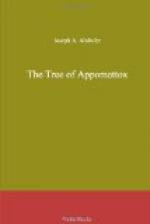As they rode on the country was still marked by desolation. The fields were swept bare or trampled down. Many of the houses and barns and all the fences had been burned. The roads had been torn up by the passage of artillery and countless wagons. All the people seemed to have gone away.
But when they came into rougher and more wooded regions they were shot at often by concealed marksmen. A half-dozen troopers were killed and more wounded, and, when the cavalrymen forced a path through the brush in pursuit of the hidden sharpshooters, they found nothing. The enemy fairly melted away. It was easy enough for a rifleman, knowing every gully and thicket, to send in his deadly bullet and then escape.
“Although it’s merely the buzzing and stinging of wasps,” said Warner, “I don’t like it. They can’t stop our advance, but I hate to see any good fellow of ours tumbled from his horse.”
“Makes one think of that other ride we took in Mississippi,” said Dick.
“In one way, yes, but in others, no. This is hard, firm ground, and we’re not persecuted by mosquitoes. Nor is the country suitable for an ambush by a great force. Ouch, that burnt!”
A bullet fired from a thicket had grazed Warner’s bridle hand. Dick was compelled to laugh.
“You’re free from mosquitoes, George,” he said, “but there are still little bullets flying about, as you see.”
A dozen cavalrymen were sent into the thicket, but the sharpshooter was already far away. Colonel Hertford frowned and said:
“Well, I suppose it’s the price we have to pay, but I’d like to see the people to whom we have to pay it.”
“Not much chance of that,” said Colonel Winchester. “The Virginians know their own ground and the lurking sharpshooters won’t fire until they’re sure of a safe retreat.”
But as they advanced the stinging fire became worse. There was no Southern force in this part of the country strong enough to meet them in open combat, but there was forest and thicket sufficient to shelter many men who were not only willing to shoot, but who knew how to shoot well. Yet they never caught anybody nor even saw anybody. A stray glimpse or two of a puff of smoke was the nearest they ever came to beholding an enemy.
It became galling, intolerable. Three more men were killed and the number of wounded was doubled. The three colonels held a consultation, and decided to extend groups of skirmishers far out on either flank. Dick was chosen to lead a band of thirty picked men who rode about a mile on the right, and he had with him as his second, and, in reality, as his guide and mentor in many ways, the trusty Sergeant Whitley. It was altogether likely that Colonel Winchester would not have sent Dick unless he had been able to send the wise sergeant with him.
“While you are guarding us from ambush,” he said to Dick, “be sure you don’t fall into an ambush yourself.”




